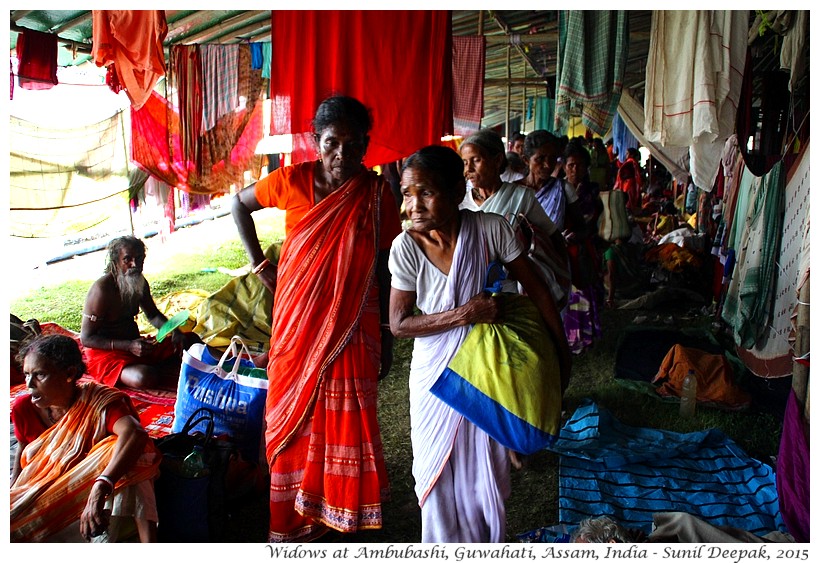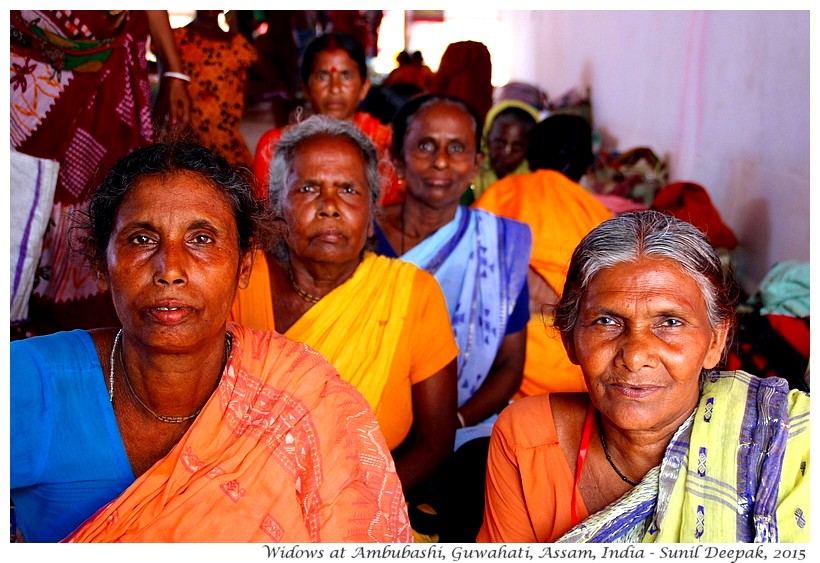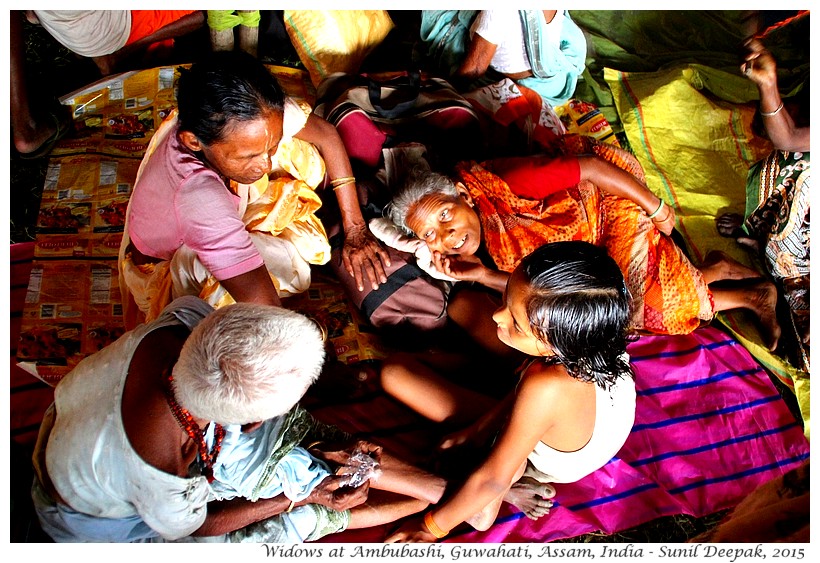


Guwahati, Assam, India: Among the persons who had come for the Ambubashi festival, there were many widows, usually in small groups or accompanied by their families. It was easy to identify them - they did not have red bindi or vermilion on their foreheads. Looking at them you could see how the lives of widows in the villages are slowly changing. Some were not wearing white, rather they had saris of light colours. Many did not have short hair, others had necklace or ear-rings. None of them refused me a picture and many of them came to ask me to photograph them. If I had more time and did not have the language difficulty, I would have loved to talk to them to know more about their lives.
गुवाहाटी, असम, भारतः अम्बुबाशी पर्व में विभिन्न राज्यों से आये लोगों में बहुत सी विधवाएँ भी थीं, अक्सर छोटे गुटों में या परिवार में बच्चों के साथ. उन्हें पहचानना कठिन नहीं था - उनके माथे पर लाल बिन्दी या सिन्दूर नहीं थे. उन्हें देख कर यह समझ आता था कि किस तरह से गावों के समाज में विधवाओं का जीवन बदल रहा है. कुछ ने सफेद साड़ी के बदले हल्के रंगों की साड़ियाँ पहनी थी, बहुतों के बाल नहीं कटे थे, किसी के गले में माला थी या कान में बुन्दे थे. फोटो खिंचवाने के लिए किसी ने न नहीं कहा, कई तो स्वयं मेरे पास आयी तथा मुझे अपनी फोटो खींचने को कहा. अगर मेरे पास कुछ समय होता तथा भाषा की दिक्कत न होती तो अवश्य उनसे बात करके उनके जीवन के बारे में जानने की कोशिश करता.
Guwahati, Assam, India: Tra le persone venute per la festa di Ambubashi, vi erano molte vedove, spesso in piccoli gruppi o accompagnati dalle famiglie. Era facile identificarle - non portavano il puntino rosso e vermiglio sulla fronte. Guardandole, potevi capire come sta cambiando lentamente la vita delle vedove nei villaggi. Alcune non portavano il bianco, invece avevano i sari in colori chiari. Molte non avevano i capelli tagliati corti, e altre portavano collane o orecchini. Nessuna di loro aveva rifiutato di farsi fotografare, al contrario, molte erano venute da me per farsi fotografare. Se avevo più tempo e conoscevo meglio la lingua, mi sarebbe piaciuto parlare con loro per capire di più sulle loro vite.
***
That's nice to know. Through the years in India, widows have had to suffer a lot. I know for a fact that they are not allowed to participate in religious functions so that the 'misfortune' that supposedly becomes part of their existence doesn't bring bad luck to the proceedings. India is changing in bettter ways than imagined I guess. Thanks for this post.
ReplyDeleteThanks Vibha. As son of a young widow, I saw firsthand, how society treats widows. I also saw that we can challenge those norms, especially in the cities. The widows in villages and more traditional setups do continue to face larger challenges. Unfortunately, the changes are very slow.
Deleteये बहुत विचित्र और आशचर्यजनक है कि इतनी सारी विधवाएं हमारे समाज में हैं ? कभी विस्तृत रूप से लिखियेगा इस विषय पर !!
ReplyDeleteयोगी हमारे समाज में विधुर पुरुष अक्सर दूसरा विवाह कर लेते हैं. अकेले भी रहे तो उन्हें देख कर नहीं कह सकते कि वह विधुर हैं. उन पर कोई सामाजिक बँधन नहीं होता न ही उनका त्योहार विवाह आदि में हिस्सा लेना अशुभ माना जाता है. पर विधवाओं पर इनमें से कोई बात लागू नहीं होती तो उनका अलग दिखना स्वाभाविक है.
Deleteअभी दिल्ली बहुत दूर है ...
ReplyDeleteमर्मस्पर्शी प्रस्तुति ..कटु सत्य
धन्यवाद कविता जी. भारत का ग्रामीण समाज बहुत धीरे धीरे बदलता है, कभी बजाय आगे बढ़ने के पीछे हो जाता है.
Delete